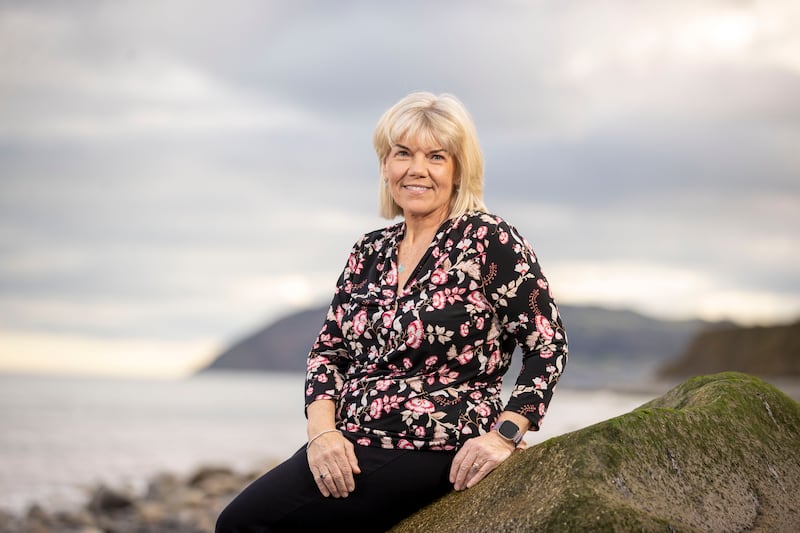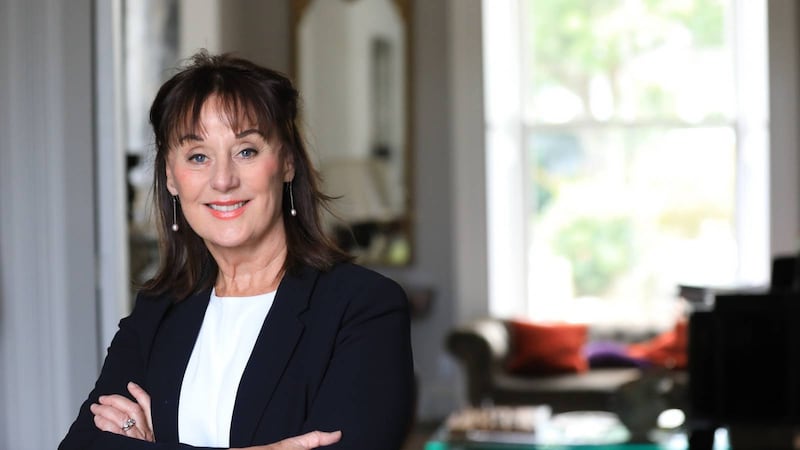Suzanne Noonan, a mother of three children, struggled for months with debilitating anxiety, hot flushes and poor sleep but was afraid to look for hormone replacement therapy (HRT) as there is a history of breast cancer in her family.
A friend, a beautician who had heard clients say HRT had changed their lives for the better, urged her to try it. By the time Noonan (45) went to her GP in Co Limerick a year ago, “my adrenaline was through the roof”. The doctor reassured her about the breast cancer risks and strongly recommended HRT, as the pros outweighed the cons. “So I bit the bullet.”
Within two weeks, “I was so mellow and just felt right again in the world.” Now she recommends that any woman troubled by menopausal-related symptoms should go to their GP and “take the leap to HRT – you will not regret it”.
The message that women need not suffer in silence during perimenopause and menopause is spreading. With increasing evidence of other health benefits from the repletion of waning hormones, even those without troubling menopausal symptoms may wonder if they are missing out by not going on HRT. It doesn’t even cost anything, since the State has made the medication free since June 1st. Could that prove to be another psychological nudge?
This week there was news of a study, led by the University of Galway, that indicated a link between HRT after menopause and a lower risk of dementia. Last week, eminent consultant endocrinologist Dr Donal O’Shea talked of “medical consensus” that all women should go on it at the time of menopause, unless there are strong contraindications.
“Oestrogen replacement is good for bones, it’s good for heart, it’s good for brain,” O’Shea told Jen Hogan on The Irish Times podcast Conversations with Parents. He said he would be advising his daughters, “if I’m around when they’re post menopausal”, to go on it.
While many agreed and welcomed his comments, others had a different view.
“I think Donal should stay in his lane,” says Dr Deirdre Lundy, clinical lead of the complex menopause clinic in the National Maternity Hospital (NMH). While she says he is entitled to express his opinion, “that most certainly is not the medical consensus”.
The “actual consensus”, based on international guidelines, according to Lundy, is that there are only two reasons to go on HRT. “One is for symptom control, and in that case there is no protocol for how long to take it or when to stop it. If your symptoms continue to trouble you and you want to stay on it for 20 or 30 years, which, by the way, I’ve done myself, so I’m not an anti-HRT person, then you go right ahead.”
 Dr Deirdre Lundy: ‘A primary use of HRT, even for people with no symptoms, would be low bone quality.’ Photograph: Tom Honan
Dr Deirdre Lundy: ‘A primary use of HRT, even for people with no symptoms, would be low bone quality.’ Photograph: Tom Honan
The second indication for treatment is bone density. “A primary use of HRT, even for people with no symptoms, would be low bone quality.”
In addition to proven benefits for the heart and bones, it is believed there are other positives “but the data is not there yet. That is why the consensus is not to put everybody on HRT and not to stay on it forever”.
About 20-30 new people a month are seen at the NMH clinic, one of six public, specialist menopause services around the country. GPs, who do most HRT prescribing, can refer more complex cases to these clinics.
The decision whether or not to take HRT is very individualised, says Cork GP Dr Ciara McCarthy, clinical lead for women’s health in the Irish College of General Practitioners. It should only be considered by somebody after discussing with a GP the risks and benefits for them personally. Despite it being acclaimed as good for the heart, “the international guidelines would say that HRT is generally not recommended for asymptomatic women solely for the prevention of cardiovascular disease”.
Cardiologist Dr Blaithnead Murtagh of Blackrock Health in Galway also stresses the need for “a holistic, individualised approach to menopausal women, including lifestyle advice, diet modification, as well as discussion on the role of HRT”. If there are no problematic symptoms, she does not recommend HRT for future cardiac health reasons.
However, HRT prescribed before the age of 60, or within 10 years of the menopause, “is likely associated with a reduction in coronary heart disease and cardiovascular mortality”. Women with early menopause, she adds, should be encouraged to use HRT until the average age of menopause, which is 51 in Ireland, according to the HSE.
Changing the narrative to view menopause as part of healthy ageing may better empower women to navigate this life stage
— Prof Martha Hickey
Periods stopping before the age of 45 is considered early menopause and puts women at a higher risk of not only cardiovascular disease but also bone loss, says McCarthy, which is another reason HRT would be recommended. Older women who have, or are at high risk of developing, osteoporosis could also benefit.
During a menopause consultation, other factors that may be relevant to optimising health will be considered, such as vitamin D, calcium, smoking cessation, weight-bearing exercise and healthy diet. Addressing problems with blood pressure and high cholesterol, “will lead to knock-on improvements in long-term cardiovascular risk without taking HRT”.
An increased risk of breast cancer, which is the concern women most often raise, is small, she says. The 2002 study by the Women’s Health Initiative, which linked HRT to an elevated risk of breast cancer, as well as blood clots and stroke, is now regarded as flawed, although the fear it generated still lingers.
“Family history of breast cancer does not preclude the majority of women from using HRT,” says McCarthy. “But what your family history influences is your baseline risk of developing breast cancer.”
The average woman, without a strong family history, has a 23 in 1,000 baseline risk of developing breast cancer in their 50s. This increases to 27 in 1,000 within five years of being on combined HRT, ie oestrogen and progestogen. However, among those on oestrogen-only medication, breast cancer incidence actually drops, to 19 per 1,000 women aged 50-59. (Most women are prescribed a combined form because progestogen is needed to protect against womb cancer.)
The risk of breast cancer increases the longer HRT is used. The decision to start, or continue, is generally down to a person’s perception of acceptable risks, adds McCarthy.
I asked my GP for HRT patches a few times before finally being listened to. It’s a game changer
— Tracey Latham
There is both “toxic negativity” and “toxic positivity” towards HRT, and it is about finding a balance, says GP Dr Brian Kennedy, clinical lead at the midwest complex menopause clinic in Nenagh, Co Tipperary.
“I wouldn’t agree that everybody needs HRT, but I do think everybody needs a conversation about HRT. Everybody needs to be aware of the risks and benefits and make their own decision,” he says.
He thinks for about 20 per cent of women, menopause “is like a horrific illness – a mixture of physical, psychiatric and social unwellness that is so disabling”. It is obvious they need HRT. Another 20 per cent are probably okay without it – and there’s everybody in between. Hot flushes, insomnia and night sweats are widely recognised symptoms, but more subtle signs, such as brain fog, weight gain and stiff, sore joints, tend to be underplayed.
Kennedy points out to patients that perimenopause and menopause do not happen in a vacuum. It is generally a very vulnerable time in women’s lives. They may be caring for teenagers or children, as well as ageing parents, and being pulled in all directions, while approaching the end of their fertility.
“HRT is not going to solve everything, but it is definitely much more of a help than a hindrance in the vast majority of cases,” Kennedy says.
There will always be women averse to pharmaceutical remedies for what is a natural transition in life. Indeed, the misconception of the menopause “as always being a medical issue which consistently heralds a decline in physical and mental health should be challenged”, argues Prof Martha Hickey of the Royal Women’s Hospital in Melbourne, Australia, in the Lancet medical journal. “Changing the narrative to view menopause as part of healthy ageing may better empower women to navigate this life stage and reduce fear and trepidation among those who have yet to experience it.”
 Prof Rose Anne Kenny, head of medical gerontology at Trinity College Dublin
Prof Rose Anne Kenny, head of medical gerontology at Trinity College Dublin
Prof Rose Anne Kenny, head of medical gerontology at Trinity College Dublin and founder of the Irish Longitudinal study on Ageing (Tilda), agrees “100 per cent” with O’Shea’s sentiments.
“I feel very strongly that as medics we should be taking a much more holistic approach to HRT for women.” The protection it offers for bone density, for example, is important because fractures are a big reason for older people’s health going downhill. “The earlier you get in, the better – once your hormones have attenuated and you’re menopausal,” Kenny says.
While it is primarily of value for menopausal symptoms, broader benefits include lubrication of mucosal surfaces, such as the mouth, eyes and vagina.
“These aren’t related to diseases as such, but they’re very much related to quality of life for women.” Vaginal dryness can be classed as a menopausal symptom, she says. “Everybody gets that post menopause.”
According to the Department of Health, the State will meet the cost of HRT where it has been prescribed “for the purpose of alleviating the symptoms associated with all stages of menopause”. Budget 2025 allocated €20 million for this scheme and, as the pharmacy dispensing fee is now also covered, this was increased to €24 million for 2026.
“It’s fabulous now I don’t have to pay for it,” says Suzanne Noonan, who feels she never wants to come off HRT. “I see it as just replenishing the hormones that my body no longer produces. There’s no need for suffering any more like our mothers and our grandmothers did.”
“I went through perimenopause and menopause not knowing,” says Tracey Latham, now aged 45. She initially put excessive sweating down to unhealthy lifestyle choices, but was also very angry and irritable.
“I asked my GP for HRT patches a few times before finally being listened to. It’s a game changer – if only I was on them sooner, life would have been much better.”
[ Perimenopausal and menopausal skin: How to tackle the most common problemsOpens in new window ]
However, Anne from Co Wicklow says: “Personally, I started HRT and immediately felt much worse. I stopped it and felt better.”
Jaimie (48) says she often raised the question of menopause with a GP after her periods stopped before she was 40. Instead she was prescribed anti-depressants. She ordered a kit online that told her she was in the menopause.
“When your doctor won’t even acknowledge your symptoms, how can you proceed? I’ve tried to change GPs but there are so few in my area. It’s cruel.”
